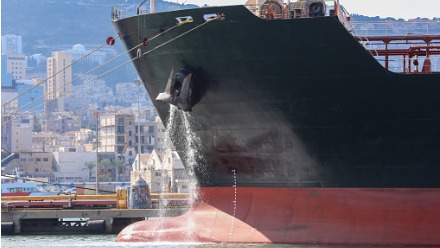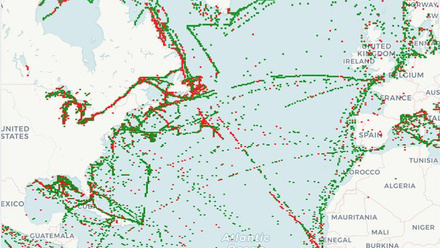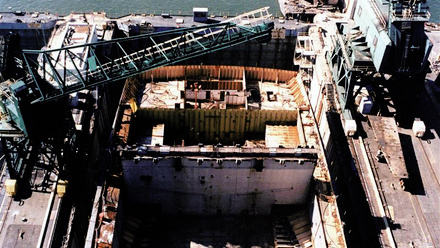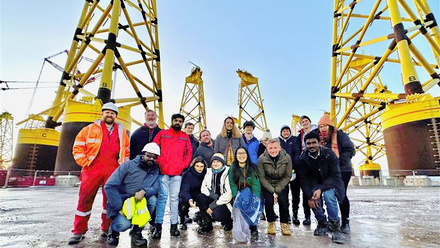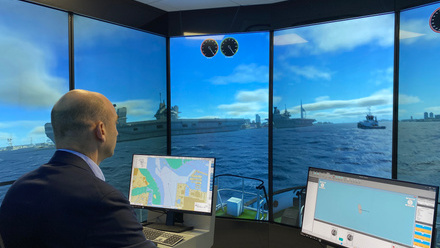Geo Connect Asia leading the way in marine data
We speak to Dinda Mazeda, one of the panellists at the conference, about how the event has played an important role in the conversation around hydrospatial science
The recent two-day Geo Connect Asia 2024 conference brought together key figures from more than 100 of the region’s leading companies to discuss Asia’s fast expanding marine geospatial, positioning and location intelligence, and remote sensing markets.
One of the participants was Mazeda, an IMarEST Affiliate Member and Environmental Engineer with global marine infrastructure company Boskalis, was part of a panel discussion that looked at the opportunity to create consistent, accessible data in the increasingly relevant hydrospatial domain.
“Hydrospatial has various definitions but, from my perspective, hydrospatial refers to all the data that is relevant to the marine environment, and especially in terms of positioning. Hydrospatial as a concept has been around for a few years but compared to all the technology and databases concerned with the above-sea domain, hydrospatial resources are nowhere near as mature,” Mazeda states.
“The information that we know about the ocean is very much on the surface. We don’t really know about a lot of things, not only about the offshore area, but also the coastal area. In fact, we know more about aerospace exploration compared to ocean exploration.”
What Mazeda and her fellow panellists discussed at the conference was how to build that data, and especially how to create a hydrospatial domain.
“At the moment, the people working in this area are working in isolation. For example, the responsibility of government agencies is often to prepare bathymetry data (measuring ocean depth), maintain that information and share it with the public for safe maritime navigation.
"But, working in [the] private industry, I know that more and more infrastructure projects require environmental monitoring, such as oceanographic parameters, turbidity, water quality and other monitoring relevant to marine construction activities. So, industry partners monitor and gather more data than just the publicly accessible bathymetry data held by government or public bodies,” Mazeda says.
“On the panel we spoke about how some of this data is confidential, but we also looked at how we could bring together all these industry partners to create collaborative platforms to increase the availability of hydrospatial data that could be shared with the public.
"One of our panellists shared the concept of crowd sourcing all the data, with information being gathered from multiple sources, not just in industry but from the public as well, such as pleasure craft vessel users. If we have a better idea of how coastal areas behave, and how the oceans behave, it will greatly improve decision-making processes.”
Exciting developments for Asia and Singapore specifically
The fact that Singapore hosted Geo Connect Asia 2024 was particularly pertinent to this discussion because Singaporean authorities used the occasion to announce its fledgling hydrospatial portal. For Mazeda, who is based in Singapore, this is an exciting development.
"Basically it is a collaboration between multiple government agencies in Singapore. They have been working on this for a few years and while it is not open to the public yet, they are actively working on building the infrastructure,” she enthuses.
“From marine and hydro, what I can say is that there is a lot of enthusiastic participants across the region. Panellists at the Geo Connect Asia conference came from Indonesia, Vietnam, Malaysia, and also experts from Canada and the US.
“It’s a very exciting area. Although we didn’t speak about it on the panel, one hot topic right now is deep-sea mining. We don’t know a lot about what is happening in the deep-sea area, there’s not enough data, especially direct position data. We only know about 5% of our ocean but with the need to transition to a more sustainable future, we have to know more.”
MarEST and women in science, technology, engineering, and mathematics (STEM)
Mazeda is a co-founder of 21st Century Kartini, a community platform for Indonesian women in STEM. Within IMarEST, she says, she has found some fellow supporters to the cause.
“I’ve recently joined the IMarEST community, and I’m very passionate about community building, especially among women members,” she says.
“From what I have seen, IMarEST has many Special Interest Groups (SIGs) in various topics such as AI in maritime, ocean governance and many others. Although the interest group that is focused on women’s issues in the marine industry has not been formed formally, I have met virtually with the other women members of IMarEST, and I am very much looking forward to working with them to help increase the representation of female scientists and engineers in the marine industry.”
On behalf of the event organisers, Montgomery Group, Rupert Owen, says: “The response to the addition of Marine and Hydro Asia, alongside Geo Connect Asia, successfully provides the base for expanding knowledge and sharing experiences across the Southeast Asia region. The focus of the event on proven case studies and successful strategies for collecting and sharing data for improved decision making provides a strong basis for the expansion of the 2025 event.’’
Main image: Dinda Mazeda speaks at Geo Connect Asia 2024; credit: Geo Connect Asia

